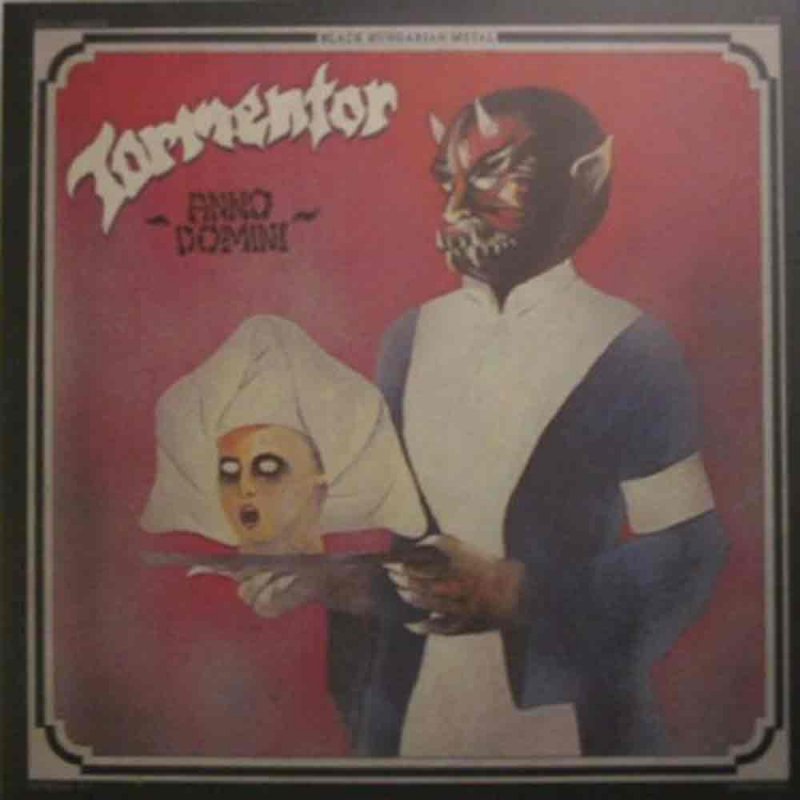
Shadows Over a Lost Kingdom
The roots of heavy metal’s evilest progeny—black metal—go back. The genre is old, tenebrous and snakelike. What Venom, Hellhammer, Bathory and Mercyful Fate founded and then engendered in the early-to-mid-’80s transmuted to varying degrees in disparate parts of the world not many years later. As the first wave crashed, the second wave had already begun. In Norway, Greece, Brazil, Switzerland, the United States, Canada, Czechoslovakia and Hungary, the echo of the genre’s dark history started to manifest itself in new ways. The beast was changing into forms deadly and deadlier. For Tormentor, Hungarian denizens of the unlight, their world was gray, uninspired and overruled by mediocrity. It was only when Eastern Bloc copies of Slayer, Possessed, Bathory and Venom—mere offprints of the originals—hit the Hungarian tape-trading circuit that the electricity and occult allure of heavy metal’s most villainous forms became a lightning rod for the Budapest-based quartet.
Formed in 1985, Tormentor quickly got to work, jamming in inhospitable places on very expensive equipment (for the era and region) while the Communist authorities peered in surreptitiously from their concrete towers. The school-age Hungarians weren’t necessarily a threat yet, but the potential for their noisy din to spark social upheaval was top-of-mind for suspicious and easily unsettled government officials. Members of Tormentor downplay the observational role of the then-Communist party, but “Western” ideals—i.e., noisy, deathly metal—were state enemies. Nevertheless, the members of Tormentor pooled their resources for their first demo, 1986’s Live in Budapest 86. In the overcast and drab mid-’80s Pearl of the Danube, Tormentor’s disturbed and derelict black resonated. Not with critics, but with like-minded youth of the day who were eager to cut the prosaic qualities of life with savage spectacle and hard-hearted metal. A Tormentor live show didn’t happen often, but when it did, word spread quickly. By 1987, demo The 7th Day of the Doom bubbled and oozed unnaturally into Hungarian metaldom. Lineup changes—Márton Dubecz (drums) and Tamás Buday (guitars) left the fold, while Zsolt Machát (drums) joined in—didn’t stop Tormentor from becoming renowned in Budapest.
When Tormentor signed on to a state-owned record label, the future looked grimly promising. With that foul wind in their sails, they wrote and recorded their debut album, Anno Domini, at one of the best studios in Hungary in 1988. But things in the Communist era didn’t pan out. Their manager and label representative Faragó Gábor vanished, and with him any chance of Anno Domini finding its way (at the time) to vinyl. Tormentor, however, managed to dub a copy, and from there, the tape-traded lore of Hungarian black metal, in the form of Anno Domini, is told. It took years of rumor-milling and copying the full album to reach the States, Western Europe, South America and Scandinavia. By that point, Tormentor had disbanded—fallen heroes in Budapest, but a rising cult outside the Soviet Bloc. Anno Domini was never officially released in its day—eventually licensed to and released by Nocturnal Art Productions/Head Not Found in 1995—but its horror and cruelty heavily influenced or inspired bands like Dissection and Emperor in the ’90s and Watain and Nifelheim in the aughts. Still, Tormentor were a footnote compared to the role frontman Attila Csihar would play on Mayhem’s near-religious awakening De Mysteriis Dom Sathanas. In fact, it was through the Norwegians that Anno Domini would surface as a must-hear relic, a gem of black metal antiquity and example of profane Hungarian enterprise.
From the gruesome “Tormentor I” and the wicked “Damned Grave” to the haunting “Beyond” and stone-cold classic “Elisabeth Bathory,” Anno Domini’s mere presence is unsettling. It feels, at its core, made of the most damnable and odious things conjurable by humans of ill intent. But that’s why it was—and continues to be—vital. Anno Domini is real. As for its story, there’s not one decisive feature—even the various iterations on Csihar’s Saturnus Productions—that unfurls Tormentor’s malevolent rise, their unceremonious downfall and Anno Domini’s subsequent cultdom as told by all four members. Decibel is hereby honored to chronicle (translated from Hungarian to English) the mighty Tormentor and their crucial black metal masterpiece, Anno Domini. Into empire of fire and blood…
Need more Tormentor? To read the entire seven-page story, featuring interviews with all members on Anno Domini, purchase the print issue from our store, or digitally via our app for iPhone/iPad or Android.




